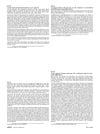 9 citations,
September 2015 in “Medical Clinics of North America”
9 citations,
September 2015 in “Medical Clinics of North America” The document explains how to do skin procedures, care after surgery, and when to use certain treatments.

A thorough skin history and examination are essential for diagnosing and treating skin conditions effectively.
 14 citations,
May 2022 in “Asian Journal of Pharmaceutical Sciences”
14 citations,
May 2022 in “Asian Journal of Pharmaceutical Sciences” New hair follicle-targeting treatments show promise for hair disorders but need more research on safety and effectiveness.
 7 citations,
July 2019 in “International archives of internal medicine”
7 citations,
July 2019 in “International archives of internal medicine” Common skin conditions can greatly affect a person's mental health and social life.
 18 citations,
May 2013 in “Journal of Dermatological Treatment”
18 citations,
May 2013 in “Journal of Dermatological Treatment” Non-ablative fractional laser treatments have a low risk of side effects in Asian patients.
 6 citations,
May 2022 in “Medicina-lithuania”
6 citations,
May 2022 in “Medicina-lithuania” IMA may indicate oxidative stress in skin and hair disorders, but more research is needed.
1 citations,
December 2023 in “Life” PRP helps skin heal, possibly through special cells called telocytes.
31 citations,
November 2020 in “International journal of molecular sciences” Adipokines affect skin health and could be targeted for treating skin diseases.
 5 citations,
January 2018 in “PubMed”
5 citations,
January 2018 in “PubMed” Biodegradable microneedle patches help topical steroids work better for prurigo nodularis.

Traumatic anserine folliculosis is a harmless skin condition in young males that needs correct diagnosis to avoid unnecessary treatments.
112 citations,
January 2013 in “Experimental dermatology” Faulty Notch signalling may cause hair follicle changes and inflammation in hidradenitis suppurativa.
19 citations,
March 2021 in “Experimental and Therapeutic Medicine” Isotretinoin can cause serious birth defects and needs careful use, especially in pregnant women.
 January 2025 in “Frontiers in Pediatrics”
January 2025 in “Frontiers in Pediatrics” Baricitinib significantly improved hair regrowth and skin condition in a 14-year-old with alopecia areata and atopic dermatitis.
1 citations,
February 2024 in “Pharmaceutics” Nanovesicles improve drug delivery through the skin, offering better treatment outcomes and fewer side effects.
 August 2021 in “Research Square (Research Square)”
August 2021 in “Research Square (Research Square)” Borneol Essential Oil could be a natural and safe acne treatment.
 8 citations,
September 2018 in “Journal of Cosmetic Dermatology”
8 citations,
September 2018 in “Journal of Cosmetic Dermatology” Lower irisin levels in the blood may indicate more severe acne.
 April 2019 in “Journal of the Dermatology Nurses’ Association”
April 2019 in “Journal of the Dermatology Nurses’ Association” A 37-year-old man with hair loss and skin issues was successfully treated with oral antibiotics, highlighting the need for early treatment. Long-term care includes low-dose antibiotics and avoiding caps and wigs.
 39 citations,
May 2011 in “Human Immunology”
39 citations,
May 2011 in “Human Immunology” Genetics play a role in acne, but how exactly they contribute is not fully understood.
 19 citations,
November 2012 in “Journal of Dermatological Treatment”
19 citations,
November 2012 in “Journal of Dermatological Treatment” Isotretinoin improves severe acne without changing androgen or insulin levels but may increase body weight and triglycerides.
 7 citations,
January 2019 in “Postepy Dermatologii I Alergologii”
7 citations,
January 2019 in “Postepy Dermatologii I Alergologii” Certain gene variations might be linked to severe acne in women but not in men.
 February 2024 in “International journal of health, medicine and nursing practice”
February 2024 in “International journal of health, medicine and nursing practice” Raising awareness about PCOS can improve women's quality of life.
 January 2016 in “International journal of reproduction, contraception, obstetrics and gynecology”
January 2016 in “International journal of reproduction, contraception, obstetrics and gynecology” A certain gene variation is linked to a higher risk of polycystic ovarian syndrome in South Indian women.
 April 2018 in “Journal of Investigative Dermatology”
April 2018 in “Journal of Investigative Dermatology”  42 citations,
September 2018 in “Journal der Deutschen Dermatologischen Gesellschaft”
42 citations,
September 2018 in “Journal der Deutschen Dermatologischen Gesellschaft” Adult female acne requires a comprehensive treatment approach, including medical options and lifestyle changes, with attention to psychological well-being.
 10 citations,
January 2016 in “Dermatology”
10 citations,
January 2016 in “Dermatology” Psoriasis lesions have fewer and smaller oil glands, which might affect the condition's development.
 April 2024 in “International journal of medical science and clinical research studies”
April 2024 in “International journal of medical science and clinical research studies” Effective acne management in PCOS includes hormone therapy, metformin, isotretinoin, weight loss, diet, exercise, and personalized treatment plans.
 February 2009 in “Journal of The American Academy of Dermatology”
February 2009 in “Journal of The American Academy of Dermatology” Fractional infrared technology is effective and safe for treating cervical laxity.
 76 citations,
December 2009 in “Clinics in Dermatology”
76 citations,
December 2009 in “Clinics in Dermatology” Hormonal treatments can help with acne but are not the first choice due to side effects and the need for careful patient selection.
 14 citations,
May 2013 in “American Journal of Physiology-endocrinology and Metabolism”
14 citations,
May 2013 in “American Journal of Physiology-endocrinology and Metabolism” Removing myelin protein zero-like 3 in mice leads to better metabolism and resistance to obesity.
 July 2003 in “Journal of Cutaneous Medicine and Surgery”
July 2003 in “Journal of Cutaneous Medicine and Surgery” Treating psoriasis with UVB light three times a week is faster than twice a week, and certain medications and lifestyle factors affect psoriasis treatment outcomes.

























